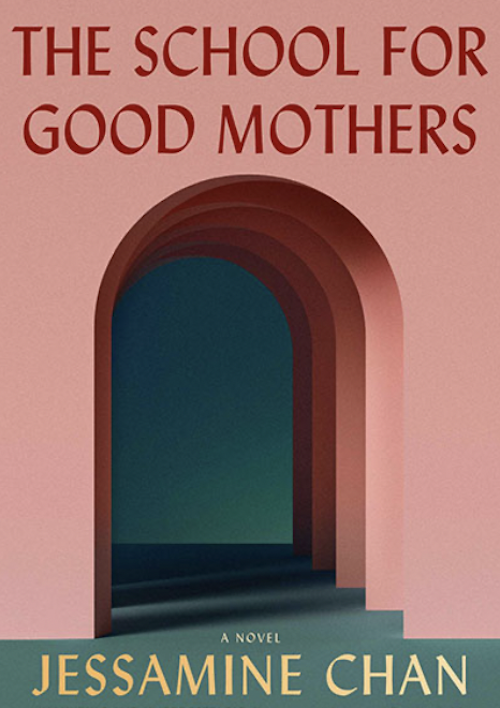This Debut Novel About Motherhood is Chilling
In “The School for Good Mothers,” mom shaming is government business
In Jessamine Chan’s much-anticipated debut novel The School for Good Mothers, Frida Liu leaves her 18-month-old at home in an ExerSaucer for two hours while she runs in to work. When her crying baby is discovered, Frida is reprimanded by the state and sent to a government-sanctioned institution to learn perfect parenting. Naturally, it’s terrifying. Zoomer asked the Chicago-based writer about not-so-distant dystopian futures, her worst “mom-shame” experience, and how it feels to be compared to Margaret Atwood.
Rosemary Counter: This is going to be a hard story for me to write without spoiling anything! Where did the idea come from?
Jessamine Chan: The book emerged from my intense anxiety about motherhood. I had a lot of angst and indecision around whether to have a child and I was just generally freaked out about motherhood. I read an article in The New Yorker called “Where is Your Mother?” by Rachel Aviv about a single mother who left her toddler son at home one day and never got him back. She had this nightmarish, Kafkaesque experience with the system and social workers and parenting classes. She could never get anything right, everything was stacked against her, and something about it planted a kernel of rage in me. I took the idea to a writer’s conference and was convinced it could be a novel.
RC: When did you possibly have time to write a novel with a baby?
JC: I actually started the book three years before getting pregnant, and my daughter is turning 5 on Sunday, so it took a while. Do you have kids?
RC: Yes, I have a four-year-old daughter. I’m not sure when I’ll find time to write this article.
JC: Ah, so you get it. I had a finished draft before she was born, and then I finished it with the help of a very supportive husband and long hours at preschool. I try to make sure I talk about childcare in every single interview.
RC: It’s truly a miracle, and I like that you said that without mom-guilt. Have you ever been mom-shamed?
JC: One day at the playground when my daughter had just started walking she fell and had a gash on her leg. This other mom looked at me with side-eye and said, “Um, your child is bleeding.” It was so disdainful and I felt so ashamed in that moment. To this day, I always carry Band-Aids and hand them out to my friends. I tell them they need Band-Aids or they will be judged. Lots of these little digs landed right in the book.
RC: I thought some moms in your book are unfairly punished for minor offenses, while others are pretty bad and deserve it. As a reader, it’s uncomfortable in all the best ways to find yourself judging the characters.
JC: I wanted to write about a woman who is complicated and flawed. Frida is a Chinese-American mom, her husband has left her, she’s angry and selfish. The question about whether Frida should be more sympathetic was raised. I mean, I could have had her leave her kid in the back seat for 30 seconds, a total accident that was much more benign. But that’s too easy; I wanted the story to exist in a more morally ambiguous place. I wanted her to wrestle with guilt for really making a bad mistake.
RC: As a mother, it’s a gut punch. I used to worry I’d be out somewhere and forget I even had a baby and just leave. Did having a real-life baby in the middle of writing change the book?
JC: Motherhood turned out to be wonderful for me, partly because the book became a place to dump all the frustration and boredom. All the bad feelings I had were channeled there in advance, then once I had my daughter, I went back and revised. There was so much I just didn’t know before. The toddlers spoke in full paragraphs, for example. And I had moms bathing toddlers in sinks because I didn’t actually know how big they were. Frida got more competent as I did.
RC: The book is futuristic – no spoilers! – but also has present-day references. How real is your setting, really?
JC: I describe the book as “dystopian minimalism.” I could spend a lot of time world building, thinking about government surveillance and whether the whole place is run by drones. Or I could include just enough that the reader has to use their imagination. I also call it “alternative present,” because it was actually hard to come up with future technology that didn’t already exist. Ironically, I’ve written what some people call sci-fi even though I can’t work Siri.
RC: Some people are comparing your book to Margaret Atwood’s The Handmaid’s Tale. How does that feel?
JC: It’s totally thrilling beyond my wildest dreams, and totally bonkers. The Handmaid’s Tale is the kind of book that you read and, as a writer, you think, “Why do I bother? The perfect novel already exists.”
